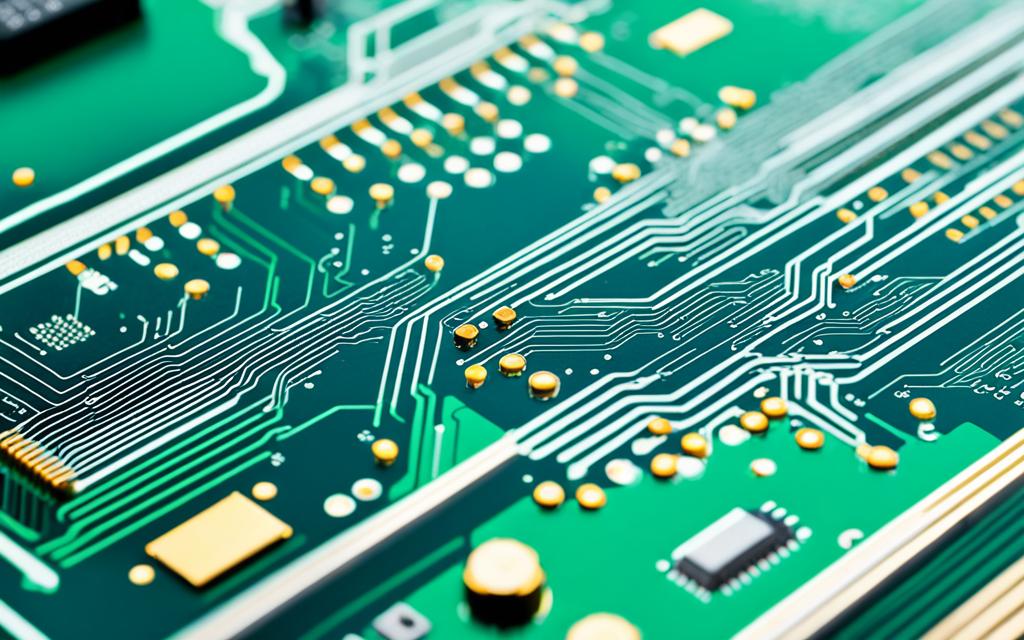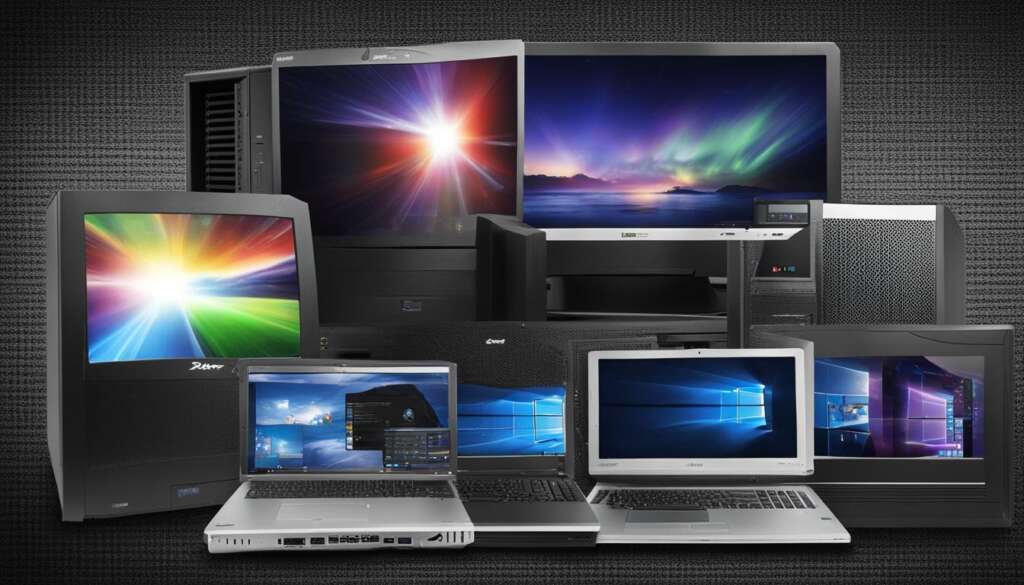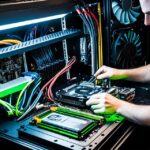Table of Contents
When checking your PC’s performance, there are key factors to look at. Knowing these will help you see if your PC is up to scratch. What makes a PC good? Let’s find out.
The speed of the processor is vital. This is measured in MHz and GHz. For the best performance, aim for a speed above 1.5GHz, especially if you’re using Windows1.
RAM is also important for your computer’s speed. It helps your computer handle multiple tasks smoothly. If you don’t have enough RAM, your PC will slow down1.
The space on your hard drive matters too. A full hard drive can make your PC slower. It shows why cleaning your computer and considering SSDs is important1.
Don’t forget about your internet speed. It’s essential for online tasks like downloading. A slow internet can affect your PC’s performance, even if it’s a high-spec machine1.
You can check your PC’s specs easily. Just go to the Control Panel, then System & Security, System, and the General tab on Windows1.
Windows has a Performance Monitor tool. It helps you see how well your PC is working in real-time. This is great for checking your speed and efficiency1.Be careful with online scans to check your computer’s speed. Always go for trusted companies like iolo to keep your PC safe1.
Key Takeaways
- Checking a PC’s performance means looking at the processor speed, RAM, hard drive, and internet speed1.
- A processor speed above 1.5GHz is best for top performance1.
- Not enough RAM can make your computer slower, so having enough is crucial1.
- A full hard drive can slow your PC down, which highlights the need for regular clean-ups and possibly upgrading to SSDs1.
- Even with a good PC, slow internet can affect performance1.
- Use the Performance Monitor on Windows to see your PC’s real-time performance1.
- Choose trustworthy online scanning software to check your speed and performance carefully1.
Assessing Hardware Specifications
When looking into a PC, check out the hardware specs first. The CPU, RAM, and graphics card are very important. They greatly affect how well the computer works. Knowing about these can help you understand what your PC can do.
The CPU: Powering Performance
The central processing unit (CPU) is like the computer’s brain. It handles calculations and instructions so everything runs smoothly. The CPU manages tasks, processes data, and allows different parts to communicate.
Look at the CPU’s type, speed, and how many cores it has. These details show how well it can process things and do multiple tasks at once. A faster speed and more cores mean it’s better at running heavy apps and multitasking.
New CPU generations are often better and more efficient. But, be aware that making a CPU run faster than intended can be risky. It might overheat or get damaged if not done right2.
RAM: Enabling Smooth Operation
Random-access memory (RAM) is crucial for quick data access. It helps the CPU work on tasks faster, making your PC more responsive. RAM is where data is stored temporarily for speedy retrieval and processing.
When checking RAM, consider how much it can hold and its speed. More gigabytes (GB) mean it can store more at once. This is really helpful when you’re using a lot of programs at the same time. The speed shows how fast it exchanges data with the CPU.
If there’s not enough RAM, your computer will be slow. It’ll use the hard drive or SSD instead, which is much slower. This can cause delays and even make your computer freeze3. More RAM can fix these issues.
Graphics Card: Enhancing Visual Experience
The GPU (graphics processing unit) takes care of visuals. This includes images, videos, and animations. By handling graphics, it lets the CPU do other things more efficiently. This makes for a better viewing experience.
Look at the graphics card’s model, memory, and how it performs. The type of card shows what it can do, like gaming or design work. Memory, measured in GB, impacts how well it can display detailed images.
Keep the graphics card’s drivers updated to ensure it works well. Outdated drivers can cause problems and slow down your PC4. Upgrading your graphics card can improve how games look and run and enhance other graphic-heavy tasks.
| Component | Specifications | Consideration | |
|---|---|---|---|
| CPU | – Processor type, clock speed, and cores | – Higher clock speed and more cores indicate better performance – Risk and benefits of overclocking |
|
| RAM | – Capacity and speed | – Sufficient RAM for multitasking – Faster data access contributes to smoother operation |
|
| Graphics Card | – Model, memory capacity, and benchmarks | – Capabilities for resource-intensive tasks – Regular driver updates for optimal performance |
Checking a PC’s hardware like the CPU, RAM, and graphics card tells you about its performance. Upgrading these parts can boost speed, improve how smoothly it runs, and make visuals better. Knowing these specs is key to getting the most out of your PC.
Comparing PC Performance
Benchmarking your PC helps you understand how well it works. You can compare your system with others by running tests. PCGameBenchmark lets you check your computer against many others. You’ll get a score showing if it can handle top PC games5.
It’s key to look at hardware and overall performance when benchmarking. This helps you decide on upgrades to improve your PC. Tools like 3DMark are great for getting reliable results6. But, for older PCs, you might need to use older software6.
Benchmark scores are usually simple numbers for easy comparison. But remember, tools like 3DMark might not capture everyday performance accurately6. Using additional tools such as Geekbench can give a fuller picture of your PC’s ability6.
Looking at each component, like the CPU and GPU, tells you a lot. Tools like SANDRA can show where to improve. For instance, adding more RAM or an SSD can make a big difference6.
When comparing PCs, also think about warranty and how easy it is to upgrade. These factors influence how happy you’ll be with your purchase6. Plus, your PC should meet the needs of what you mostly do, like office work. Match your upgrades to what tasks you do most6.
Knowing how your PC performs is crucial to making it better. Choose the right tools to test it and pay attention to what improves performance. This way, you can make smart upgrades. Benchmarking is your ticket to getting the most out of your PC6.
Analyzing Gaming Capabilities
When you look into your PC’s gaming strength, checking game requirements is key. This ensures your gameplay is both smooth and fun7.
Gaming computers differ in shape and performance levels7. Small ones fit tight spots but might lack in upgrades and cooling7. Mid-towers offer a sweet spot with better upgrade and cooling options7. Full towers, though pricier, give lots of room for parts and are easy to handle7.
Cores matter a lot in gaming processors7. For decent game play, four cores is the minimum7. AMD gives good deals at various prices, while Intel balances work and gaming needs well7.
Graphics cards are vital for gaming PCs7. Better cards mean sharper images for 4K and features like ray tracing7. Cards need over 8GB VRAM for top performance in new games7.
Don’t forget about RAM7. Games mostly need 16GB to 32GB of RAM. Some gamers might want 64GB for other apps7. Using two RAM sticks for dual-channel memory doubles speed7. DDR5 is the future but DDR4 still works well7.
Looking at CPUs, consider speed, cores, and extras8. Fast speeds and more cores boost game play8. CPUs with multiple cores do better with lots of tasks8.
Some Intel CPUs have built-in graphics8. Those with “F” don’t and need separate GPUs8. Intel’s H and HX chips are great for gaming laptops8.
Overclocking can up the CPU speed. “K” series CPUs are made for this8. Choose the right Intel Core based on features and gaming tests8.
For smooth play above 60 fps in tough games, a strong CPU is key8. Choose Intel Core i7 or i9 with 8GB RAM for gaming and streaming8.
By checking your PC’s gaming power and game needs, you’ll get a great gaming time7.
Considering Storage Options
Choosing the right storage for your PC is important. The decision between a solid-state drive (SSD) and a hard disk drive (HDD) affects your computer’s speed and efficiency. Let’s look at what each storage type offers.
SSDs are now more popular because they are faster than HDDs. They allow quicker data transfer and faster booting times. For example, upgrading to an SSD can shorten start-up times from 30-40 seconds to just 10-13 seconds9.
SSDs are also tougher and last longer. Unlike HDDs, they don’t have moving parts. This makes them better at handling drops and knocks. Also, SSDs use less power, which is great for laptops9.
HDDs usually have more storage space. But, SSDs now offer up to 4TB of space. That means there’s an SSD out there for everyone, from everyday users to serious gamers9.
Games need a lot of space these days. Some games take up to 150GB. So, having enough storage is essential for smooth play. A 500GB SSD might fit a few big games. But gamers with many games might need 2TB, 3TB, or 4TB of space10.
Kingston Technology leads in offering high-performance SSDs. Their products reach read speeds up to 7,300MB/s and write speeds up to 7,000MB/s. These speeds are excellent for demanding tasks9.
| Storage Option | Speed | Capacity | Durability |
|---|---|---|---|
| SSD | Fast data transfer speeds | Up to 4TB | No moving parts, more resistant to shock and impact |
| HDD | Slower data transfer speeds | Higher storage capacities | Contains rotating disks, more susceptible to damage |
Your needs decide whether you should get an SSD or an HDD. If you want fast speed, durability, and performance, go for an SSD9. But, if you need lots of space and can handle slower speeds, an HDD could be better.
Think about what you need from your storage. This will help make your PC faster and your experience smoother.
Factoring in Upgradeability
Choosing a personal computer means thinking about how you can upgrade it, make sure it’s compatible, and keep it current. Upgrades help your PC keep up with new tech and last longer. This means it performs well for more years.
The Lenovo PC Upgrade Guide11 says PC parts usually last 4 to 5 years before needing an upgrade. But, graphics cards need updating every 2 to 3 years. Updating your graphics card improves gaming, makes visuals smoother, and makes games more immersive.
Another key upgrade is your RAM. For day-to-day use, 8GB of RAM is good. But gamers should consider 16GB to 32GB. This helps with demanding tasks11.
Storage also affects your PC’s speed. Upgrading to a solid-state drive (SSD) can boost storage any time11. SSDs are faster than old hard disk drives, cutting down on load times for games and files.
It’s important to keep your PC cool for its lifespan and performance. Ideal temperatures are around 40 degrees Celsius when idle. During gaming, it should stay between 70 to 80 degrees Celsius11. Better cooling, like fans or liquid systems, stops overheating and keeps your PC running smoothly.
Keeping your PC clean is crucial too. Dust can block airflow and heat up your PC, causing it to slow down or become unstable. Cleaning fans and heat sinks regularly is a must11.
Upgradeability also means checking if parts will work together. There are many types of computer memory and connections. Following standardization rules helps avoid damage to your PC12. Always check if new parts fit and work right12.
Focusing on upgradeability, compatibility, and being up to date means your PC can keep up with your needs. Whether it’s for better gaming, more storage, or keeping it cool and clean, investing in upgrades is wise. It makes your PC better and last longer.
“The ability to upgrade your PC is key for its long life. Upgrading helps you stay current, improve performance, and extend its lifespan.”
Here’s a guide to different PC form factors and their benefits:
| Form Factor | Advantages |
|---|---|
| Traditional Tower | Most space for components and expansions, customizable configurations |
| Microtowers | Similar advantages to traditional towers with a reduced physical footprint |
| HP Slim | Compact build, suitable for limited spaces |
| All-in-One (AiO) | Consolidates hardware into the display unit, saves space |
| HP Mini PCs | Compact size, comparable to laptops |
| HP small form factor (SFF) PCs | Performance and expandability in a compact footprint |
| Laptops and Notebooks | Portable designs, ideal for on-the-go productivity |
| Mobile Workstations | High-powered configurations with mobility |
| Convertible x360 Laptops | Adjustable hinges for versatile usage |
Considering upgradeability, compatibility, and form factors helps you make a smart choice. This ensures your PC fits your needs now and later.
Conclusion
After looking into your PC’s performance, you can decide on upgrades or improvements. Considering hardware specs, comparing performance, and looking at gaming skills will help. Storage options and how easy it is to upgrade are also key to making your PC fit your needs.
CPU power is crucial for gaming, shows research13. A better graphics card improves your gaming fun too13. Using more than one graphics card boosts this even further13. It’s also vital to choose the right processor and generation for top performance14. The amount of RAM and choosing an SSD impact how fast and well your PC works14.
When picking laptops, knowing about different market options helps15. Even with a tight budget, choosing brands like ASUS, MSI, HP, and Acer can give you a good experience15. It’s about finding the right balance between how much it costs and how it performs.
FAQ
How can I determine if my PC is good?
Check your PC’s hardware specs and performance benchmarks. Look at its gaming capabilities and storage. Also, consider if you can upgrade it.
What should I look for when evaluating a PC’s hardware specifications?
Focus on the CPU, RAM, and graphics card. These are key for good performance.
How can I benchmark my PC’s performance?
Use PCGameBenchmark. It compares your PC against thousands and scores its gaming ability at recommended levels.
Why are gaming capabilities important when evaluating a PC?
Gaming capabilities show if your PC can offer a good gaming experience. Think about the games you wish to play and their needs.
Are solid-state drives (SSDs) better than traditional hard disk drives (HDDs) for PC performance?
Yes, SSDs give faster data transfer and quicker boot times. This makes them a better choice over HDDs.
Why is upgradeability important for a PC?
Upgradeability means your PC can handle new tech in the future. It helps your PC last longer and stay up to date.
Why is evaluating PC performance and quality crucial?
Checking performance and quality ensures your PC meets your needs. It makes your computing experience better.
Source Links
- https://www.iolo.com/resources/articles/speed-performance-how-fast-is-my-computer/ – Speed & Performance Tests: How Fast is My Computer? | iolo
- https://www.linkedin.com/advice/3/how-can-you-identify-areas-improvement-your-hardware-imglc – How can you identify areas for improvement in your hardware performance?
- https://www.neverblueit.com/how-to-determine-when-to-upgrade-your-computer-hardware-in-your-office/ – How to Transform Your Office Efficiency: When and Why to Upgrade Your Computer Hardware | NeverBlue IT
- https://www.avast.com/c-how-to-check-your-pc-specs – How to Check Specs on Windows PC
- https://www.userbenchmark.com/page/guide – Test, fix and upgrade your PC’s performance
- https://community.spiceworks.com/t/software-to-test-and-compare-pc-performance-hardware/714127 – Software to test and compare PC performance (hardware)?
- https://www.digitaltrends.com/computing/how-to-buy-a-gaming-desktop/ – How to buy a gaming PC for the best performance and value | Digital Trends
- https://www.intel.com/content/www/us/en/gaming/resources/gaming-cpu.html – How to Choose a Gaming CPU – Intel
- https://www.kingston.com/en/blog/pc-performance/memory-vs-storage-pc-performance – Memory vs Storage: PC Performance
- https://www.diskpart.com/articles/how-much-storage-should-a-gaming-pc-have-1796-gc.html – [2024 Update] How Much Storage Should a Gaming PC Have to Balance Performance and Needs?
- https://gizmodo.com/how-to-know-when-to-upgrade-your-pc-1845912311 – How to Know When to Upgrade Your PC
- https://www.crucial.com/articles/pc-builders/what-is-a-form-factor – What is a Form Factor? | Form Factor Meaning
- https://www.tomshardware.com/reviews/build-balanced-platform,2469-16.html – Part 1: Building A Balanced Gaming PC
- https://www.linkedin.com/pulse/buying-brand-new-laptop-computer-processor-conclusion-seth-gogo – Buying a brand-new laptop computer: Processor considerations & Conclusion?
- https://www.anandtech.com/show/2564/8 – Mobile Buyer’s Guide








